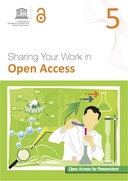Explore

Open Access for Researchers 5: Sharing your Work in Open Access
4 Ungluers have
Faved this Work
Login to Fave
This is the last Module of the course on Open Access for researchers. So far you have studied about Open Access, its history, advantages, initiatives, copyrights and licensing, evaluation matrix for research – all in the context of scholarly communication. In this Module with just two units, we would like to help you share your work in Open Access though repositories and journals.
At the end of this module, you are expected to be able to:
The curricula for researchers entitled “Open Access for Researchers” addresses OA issues within the community of research scholars. The modules cover the subject areas of Scholarly Communications, Concepts of Openness and Open Access, Intellectual Property Rights and Research Evaluation Metrics. The first four modules have been developed to nurture researchers with an elaborate understanding of the genesis, objectives, processes, types and existing limitations of OA scholarly communication, which include insights into the issues related to IPR, the methods and limitations of the process of peer reviewing and the concepts and roles of E-journals, databases, ICTs, OSS and other OERs. The final and fifth Module entitled “Sharing your Work in Open Access” provides a step-wise guideline for researchers about the process and options available for publishing their research work.
These curricula were developed after undertaking two detailed capacity building need assessment studies of librarians and researchers on Open Access. A multi-stakeholder expert meeting was organized in New Delhi, where 23 experts participated to finalize the curriculum. Two online consultations were also held to substantiate the expert meeting, which helped UNESCO to outline the content for each of the curriculum and provided a framework to develop modules.
The curricula were developed with the help of Commonwealth Educational Media Centre for Asia (CEMCA), New Delhi of the Commonwealth of Learning (COL).
At the end of this module, you are expected to be able to:
- Understand the publication process involved in dissemination of scholarly works;
- Choose appropriate Open Access journals and repositories for sharing research results;
- Use social media to promote personal research work and build reputation.
- Open Access for Researchers 1: Scholarly Communications
- Open Access for Researchers 2: Concepts of Openness and Open Access
- Open Access for Researchers 3: Intellectual Property Rights
- Open Access for Researchers 4: Research Evaluation Metrics
The curricula for researchers entitled “Open Access for Researchers” addresses OA issues within the community of research scholars. The modules cover the subject areas of Scholarly Communications, Concepts of Openness and Open Access, Intellectual Property Rights and Research Evaluation Metrics. The first four modules have been developed to nurture researchers with an elaborate understanding of the genesis, objectives, processes, types and existing limitations of OA scholarly communication, which include insights into the issues related to IPR, the methods and limitations of the process of peer reviewing and the concepts and roles of E-journals, databases, ICTs, OSS and other OERs. The final and fifth Module entitled “Sharing your Work in Open Access” provides a step-wise guideline for researchers about the process and options available for publishing their research work.
These curricula were developed after undertaking two detailed capacity building need assessment studies of librarians and researchers on Open Access. A multi-stakeholder expert meeting was organized in New Delhi, where 23 experts participated to finalize the curriculum. Two online consultations were also held to substantiate the expert meeting, which helped UNESCO to outline the content for each of the curriculum and provided a framework to develop modules.
The curricula were developed with the help of Commonwealth Educational Media Centre for Asia (CEMCA), New Delhi of the Commonwealth of Learning (COL).
Why read this book? Have your say.
You must be logged in to comment.
Editions

